In Praise of Neutrality
David Swanson / World BEYOND War
Remarks at Neutrality Congress, held April 4-6 2024 at Congress of the Republic of Colombia, Bógota, Colombia

Bógota (April 4, 2024) — The brilliant and wonderful late US historian Howard Zinn wrote that you cannot be neutral on a moving train. We all agree, I’m sure, that in the face of injustice, one should not be neutral, that silence and inaction are means of supporting those committing wrongs, that as was said by the late Dr. Martin Luther King Jr. (who was murdered 56 years ago today), silence is betrayal. But Zinn and King did what they could to get nations to stay out of wars.

NEUTRALITY ON WAR
To be neutral on war means not to engage in or support or facilitate a backward and barbaric practice that kills, injures, destroys, traumatizes, makes homeless, fuels hatred, tears down the rule of law, devastates the natural environment, diverts needed resources from environment and health and education and housing and food, impedes global cooperation on emergencies, leaves both sides worse than before, and risks nuclear apocalypse.

NEUTRALITY BECAUSE WE HAVE IMPORTANT THINGS TO DO
As President Gustavo Petro said at the United Nations last year, “While the minutes that define life or death on our planet are ticking on, rather than halting this march of time and talking about how to defend life for the future, thanks to deepening knowledge, . . . we decided to waste time killing each other.”

NEUTRALITY BETWEEN LUNATICS
So what does it mean to be neutral on war? We call it being neutral, because we mean not jumping in on either side of the murderous madness. We don’t call it indifference. If two speakers at this conference were to have a little disagreement and decide to settle it by shooting pistols at each other from ten paces apart in an old-fashioned duel, I assume the rest of us would not jump in and assist either side. But neither would we be indifferent. We would try to talk the two people out of their mad endeavor. We would ask them to join us in the 21st century where we view such things, not as honorable and noble, but as screwball and psychotic.

NEUTRALITY OVER NUCLEAR
Most humans who have ever lived have not known war. Most humans in the most warmaking nations do everything they can to avoid war. Most human societies have not known war. Many have not known even murder, even anger. If we come to understand war as not only screwball and psychotic, but also as putting at risk all life on Earth, then we can advocate for neutrality but not indifference — for a refusal to support either side, but also an invitation to both sides to join us in the 22nd century, which will likely never come to be unless war is abolished.

NEUTRALITY IS NOT ENMITY
We cannot be indifferent to war because we cannot be indifferent to war thinking, in which neutrality is almost incomprehensible. For many supporters of wars, especially while in the grip of high passion, failure to support their side simply means supporting the other side. The idea is foreign to them that there can be a coherent and constructive program that involves supporting both peoples while opposing the mass murder and destruction being done by both governments.
As people begin to think about such a strange concept, they often leap to the bizarre idea that if you oppose both sides of a war you are declaring both sides equal and identical. But of course most recent wars have been extremely one-sided slaughters. The blame has not been distributed equally. And yet, the path to a safe and sustainable world very clearly does not lie in joining the proper sides of wars. Rather it is to be found in moving the world beyond warmaking entirely.

NEUTRALITY IS NORMAL
Most nations are neutral on most wars. It’s not difficult. When the US government tried to forbid neutrality on the war in Ukraine, much of the world refused that demand. Neutrality is not difficult when a war is distant and disconnected. The need is for neutrality applied universally, neutrality on all wars, near and far.
Nations not ready to follow the wisdom of Costa Rica and abolish their militaries, and governments too afraid of their own people to train them in unarmed civilian resistance, will want to make an exception for defensive wars. And though we all know how preparation for defensive wars tends to lead to wars and also to the militarization of domestic society — and though we all know that indigenous groups have defended their land without war, and that peoples have overthrown dictators without war — allowing that exception for defensive wars could still mean a huge step in the right direction.
NEUTRALITY, NOT EMPIRE
The choice facing many countries is not neutrality or militarization, but neutrality or incorporation into a foreign empire and its global war machine, neutrality or subservience to a global Monroe Doctrine. Most military spending on Earth is done by the United States and its NATO members and partners. There are few candidates left for this global force to be opposed to, to bait into arms races, to use as justifications for its own existence. ‘
The US government spends more on its own military than all but 3 other nations combined and exports more weaponry than all but 2 other nations combined. Since 1945 the US military has fought in 74 nations. Of all the military bases on foreign soil, 90% of them are US bases. During the war on terrorism in Africa, we have seen a 75,000% increase in terrorism.
There are a lot of bad actors in the world, but the US war machine is so dominant, and so counter-productive, that choices boil down to joining it and be pushed into wars or staying out of it and maintaining some sort of peacefulness, some independence, some self-respect.

NEUTRALITY, NOT NATO
Partnering with NATO means endorsing the horrors that NATO has committed in Bosnia and Herzegovina, Kosovo, Serbia, Afghanistan, Pakistan, and Libya. In the United States NATO is used as a cover for crimes. The US Congress cannot investigate US crimes if they’re labeled NATO crimes. There will be more of them. They are how NATO justifies its existence.

NEUTRALITY, NOT HYPOCRISY
There is no war of democracies and rule-supporters against dictatorships. It doesn’t exist. The US arms, trains, and/or funds the militaries of most of the worst governments on Earth. The US is the fiercest opponent of international laws and basic human rights treaties, and abuser of the veto in the UN Security Council. The United Nations allows genocide because the US government forces it to. (But finally the US stepped aside and allowed a ceasefire vote, but promised to ignore it.) You cannot enlist on the side of both the US government and the rule of law. Better than joining NATO would be joining the Treaty on the Prohibition of Nuclear Weapons.

NEUTRALITY FACILITATES ENGAGEMENT
South Africa and Nicaragua took steps earlier this year to uphold the rule of law in Palestine. They took steps that neutral countries could also have taken. They didn’t send weapons to Palestinians. They didn’t support a vicious cycle of war madness. They proposed that the Israeli government be stopped from committing genocide. Not only could a neutral government have done that, but only a government with some degree of neutrality could have done that. Arguably, many governments have failed to do the same precisely because they are not neutral.
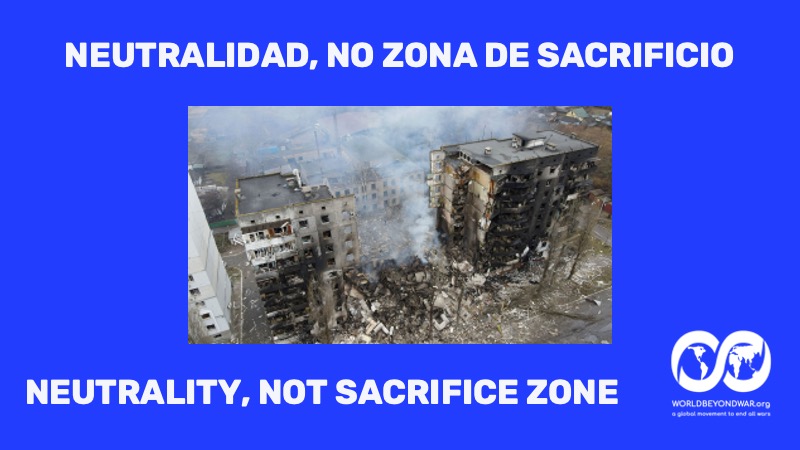
NEUTRALITY, NOT SACRIFICE ZONE
The nations professing or engaging in neutrality of one sort or another are losing Sweden and Finland, as a result of the catastrophe in Ukraine that neutrality could have prevented and that probably cannot be ended without some sort of neutrality. Sweden and Finland may come to regret their choice. When you join a military alliance, you become a possible target for its enemies, sometimes even a more likely target than the home capital of the empire. Ukraine is being treated as a sacrifice zone, and Finland can expect nothing else.

NEUTRALITY, NOT COLONY
When you join a military empire, you pay homage through weapons purchases. But the weapons come with personnel to help maintain them and train those who use them. And the personnel come with bases that grow in size and permanence. The United States is said to have 50 states but actually has many more than that. Only in 50 is there some pretense of representation in the US government. The others are to some extent actually, and to some extent merely pretend to be, independent nations.
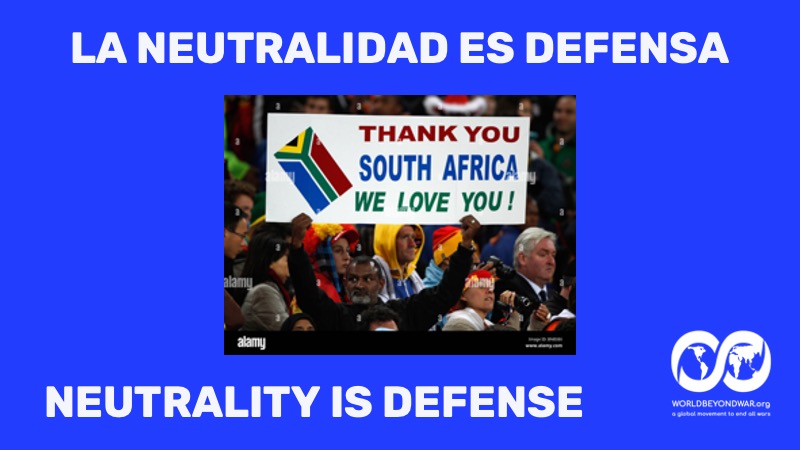
NEUTRALITY IS DEFENSE
Choosing to really be an independent nation carries risks and costs, of course. But look at how safe South Africa has made itself through its support of justice in Palestine. Who would dare attack South Africa now? A neutral nation can gain not only worldwide appreciation but also respect as an arbiter, as a peacemaker. The world needs credible neutral parties who can facilitate negotiations where there are conflicts. That is a role every nation should aspire to, and should work to set examples of for others.
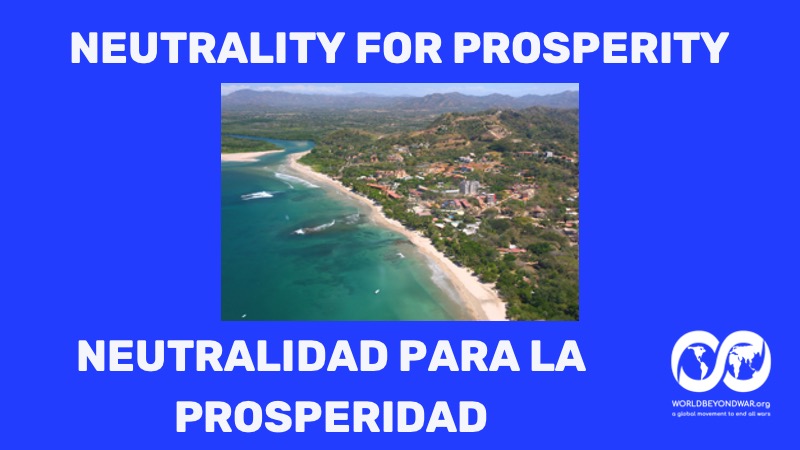
NEUTRALITY FOR PROSPERITY
By opting out as junior partner to empire, a nation may pass up the profits of weapons sales at home and abroad. But this is a dishonest argument, not a serious consideration. Most enterprises are more profitable than weapons, and have the added benefit of not killing anyone or making their loved-ones hate you.
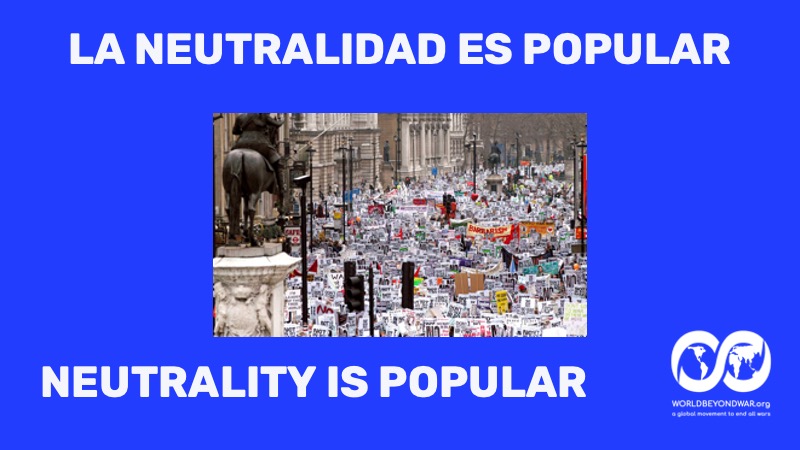
NEUTRALITY IS POPULAR
Wasting money on weapons, especially at the bidding of an obnoxious foreign leader who orders you to either buy more bombs or else he’ll urge Russia to attack you (as Donald Trump has told Europeans) is not just shameful, but also highly unpopular. People know that money is needed for human and environmental projects, and when it’s wasted on weapons tend to take to the streets in protest. The answer offered for that problem will of course be yet more weapons, and we can all see where that leads.
In the words of President Gustavo Petro, “to meet the Sustainable Development Goals, we must end all wars.”
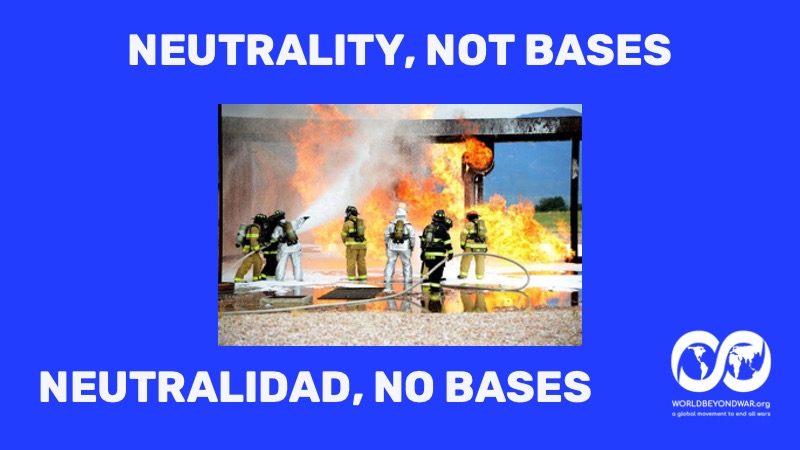
NEUTRALITY, NOT BASES
Choosing against neutrality usually means choosing US bases. And that means that parts of your land will belong to the US military; you’ll lose even the right to ask what poisons are dumped into your water, or to prosecute drunk drivers or rapists — never mind corporate abusers of workers whom the US shelters from your laws. Parts of your land and your government and your industries will be subsidiaries of the US military machine — in the case of Colombia, reunited with the canal zone as a US outpost. Bases can be little apartheid states with local residents employed in menial labor but lacking the same rights as the occupying troops.
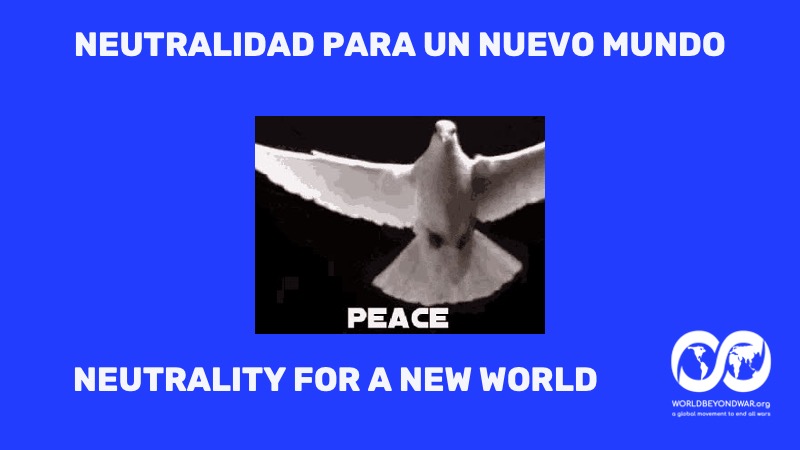
NEUTRALITY FOR A NEW WORLD
But choosing neutrality does not have to mean hostility with the US government. There are, of course, many in the US government who see it that way. Our job is to spread the idea of independent nations dedicated to an actual rules based order, not a propaganda pretense — nations unaligned with empires, neither with them nor against them, nations that can demonstrate to the US government the acceptability and benefits of other nations that are free and equal, that are in fact allies in many things, just not war, that can be allies in the work to protect the world, not through war, but from war.
